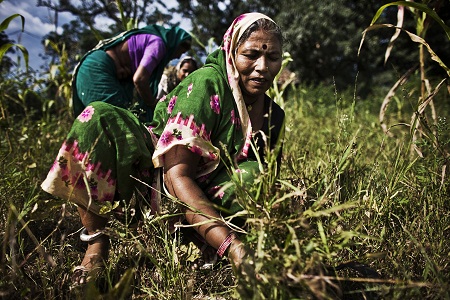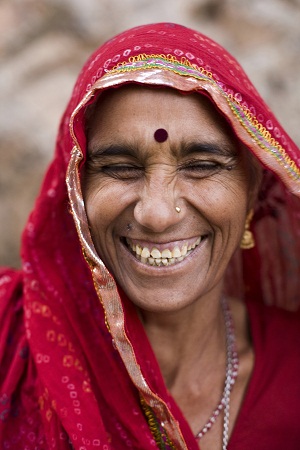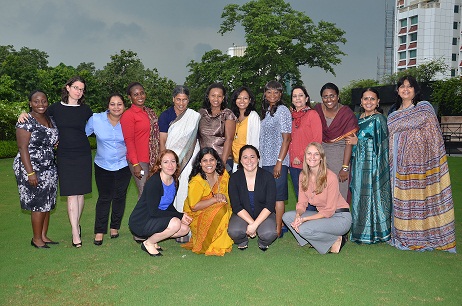I was educated to be a doctor, and look at what I became!
In India, we follow the instructions of our parents. As part of a generation and culture of doing what we are told, I dutifully attended medical school. But I never wanted to practice medicine, so I taught, got married and raised a family, always knowing that my vision for change lay outside the confines of what I had been told was ‘good’ for me.
When I joined Vital Voices’ VVLead Fellowship Program – despite being highly educated – I found a brand new world at my computer screen. Recognising that in order to advance the causes of women, women themselves must connect with, empower, equip and inspire one another at all levels of society. Vital Voices — with support from the UK’s Department for International Development — is committed to helping create a unified response, not just from women’s rights activists but also from a wide range of professionals and practitioners. Often, we don’t know our own potential until others see it in us, and Vital Voices’ partnership with DFID through VVLead has helped me to focus my vision, not just for the Kashmir region, but for my country.
Every woman has the duty to understand her own potential, make herself a success and give it back to others. Through work with over 100 other women leaders around the globe, I now know that women can and are making a tremendous difference – but that 50% of the world’s talent and potential has not been yet realized. This lopsided status is what we have to work together to change.

My leadership journey
Six years ago, I read an article in the local newspaper about male farmers committing suicide due to their inability to pay off their debts. What struck me most about the piece was their wives were left to support their families. And it was here that my calling became clear.
Women often bear the brunt of the work, but lack both voice and agency – the space to make their voices heard. Through economic empowerment and opportunities in addition to shifting cultural norms, we can change that – and the best way to do so is to lead by example. I realised that although I had always appreciated my privileged upbringing and the opportunities that it had afforded me, there was more that I could do to lead a fulfilling life while giving back to my community.

Having little background in agriculture, I began to focus on opportunities for farmers to develop high-value crops to sustain them in their daily needs. In the Kandi area, an arid agricultural zone in Kashmir, maize historically has been the predominant crop. By cultivating lavender crops, however, farmers can increase their profits by up to 20 times that of maize. By changing the mindset of farmers, I demonstrated to them that they can increase their earning potential to better support their families. Their wives, in turn, traditionally not working in agriculture, have been able to establish cottage industries using lavender to make potpourri, dried flowers and other goods – giving them a new sense of power in their households. This work has also led to a shift in the way that people perceive agriculture in my region. Previously, no one thought of farming as anything other than a means of basic sustenance. Today, the field is more widely respected and even sought after as an entrepreneurial option.
Economic empowerment through cottage industries is not enough to bring about the change that we need. Last year, I stood for election to the Kashmir Chamber of Commerce. The first woman to run for the Chamber since its inception in 1934, I lost – by 9 votes. This October, I will again run for the position. Once in office, I have made it clear to the community that my priorities are to truly understand the needs of women in business; to give girls opportunities for entrepreneurship and to advocate for both policies and implementation of these policies for gender equity.
Finally, as a result of my involvement in the VVLead Program, I started the Women’s Association of Kashmir Entrepreneurs (WAKE). WAKE was created by listening to the people and committing to make their hopes a reality. Five years from now, our goal is to establish more than 1,000 women entrepreneurs; create an incubation center for over 125 girls to start their businesses; and support more than 100 women leaders in Kashmir who will further help to create an enabling environment for women to participate in their local economies.
Women as a Force for Change

From the local to the global level, all issues are interconnected. As women, we have to think and work together to ensure that we have a voice and make it heard. This will come through education and addressing basic needs such as health care, maternal and child care and sanitation. We cannot separate social and economic issues as we strive to uplift women. I am not either a business or a political leader. I think about issues in a holistic manner. And as we proceed into the development of the post-2015 Millennium Development Goals agenda, we too must look for holistic approaches, together, to tackling problems facing the poorest women, addressing health care, education and economic empowerment.
----------------------------------------------------------------------------------------

4 comments
Comment by Shuja posted on
Great blog, I'm impressed by the initiatives Gazalla has taken. She is truly an amazing lady.
Comment by John posted on
Wow! Looking forward to hearing more about WAKE
Comment by Mukhtar posted on
Great job Gazalla Ji you made all Kashmiris proud.
Comment by Ishtiaq A Khan posted on
Great work in fact which is difficult in circumstances in India or Pakistan, where there is a lot of cultural pressure on women going out for a job. Keep up the good work Gazalla and GOD bless you....